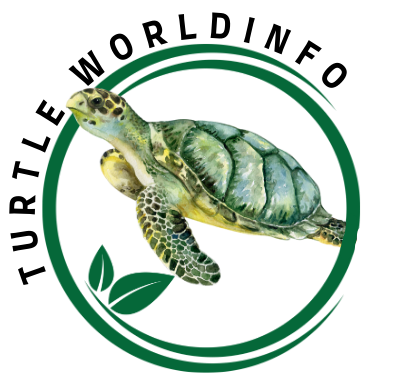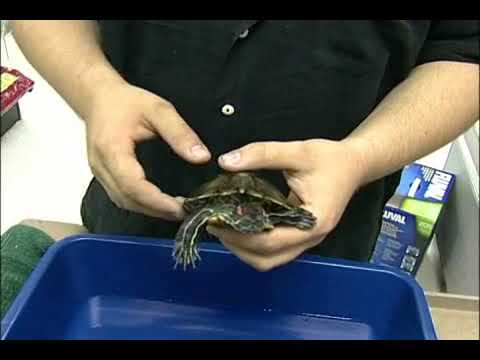Pet turtles may be cute and attractive companions, but they also come with some health hazards. Salmonella bacteria that live harmlessly in turtles can transmit illness to humans through direct turtle contact or contamination of food or surfaces.
Children are especially susceptible to developing salmonellosis from touching baby turtles under 4 inches long, leading to gastrointestinal symptoms and even hospitalization.
However, practical precautions around selecting, properly caring for, and handling turtles can let owners safely interact with these shelled pets.

This guide explains key illness risks and best practices all turtle owners should know to promote human and turtle wellbeing in the home.
Can Baby Turtles Transmit Diseases?
Baby turtles tend to harbor salmonella bacteria. This bacteria usually does not affect the turtle’s health but can be easily transmitted to humans through contact. Salmonellosis results in diarrhea, fever, and abdominal cramps.
While proper precautions allow safe turtle ownership, children under five and those with compromised immune systems have a higher risk and should avoid baby turtles. Implementing strict hygiene and habitat protocols enables enjoyable interaction with these unique pets for most people.
Key Takeaways
- Baby turtles, especially those under 4 inches, can carry and transmit salmonella bacteria to humans through contact. This can cause salmonellosis illness with symptoms like diarrhea, fever, and abdominal cramps.
- Proper precautions like handwashing, avoiding contact between turtles and food surfaces, and not keeping them in kitchens can reduce disease risks. Children under 5, the elderly, pregnant women, and those with weak immune systems should avoid contact with turtles.
- Selecting healthy turtles from reputable breeders and stores, maintaining clean habitats, and isolating new turtles can also limit contagion. Veterinary exams help diagnose turtle diseases early.
- Salmonella transmission from pet turtles is preventable with basic hygiene and common sense care. Understanding the risk allows turtle lovers to enjoy these unique pets safely.
Baby Turtles Transmitting Diseases: The Facts
Salmonella Bacteria in Turtles
Many species of turtles, especially smaller aquatic turtles like red-eared sliders under 4 inches long, commonly carry Salmonella bacteria in their digestive system.
These salmonella organisms usually don’t make turtles sick. Still, they can quickly spread to humans through contact and cause gastrointestinal salmonellosis infections.
The tiny turtle’s damp shell, water, feces, and anything in their habitats can harbor infectious salmonella.
When people touch turtles or items in a turtle tank and then touch their mouth, the bacteria can enter the body and multiply in the intestines. This leads to illness within 12-72 hours in humans.
Who is Most at Risk?
While salmonella from pet turtles can infect healthy people, some groups are more likely to develop severe symptoms and complications:
- Children under 5 years old
- Elderly adults over 65
- Pregnant women
- Those with compromised immune systems from medical conditions like HIV/AIDS and cancer treatments
These high-risk groups are more vulnerable to dehydration and dangerous spreading of infection in the bloodstream from salmonellosis. It’s generally recommended they avoid contact with tiny turtles altogether.
Preventing Turtle-Associated Salmonellosis
The number of salmonella cases, especially in children, dropped significantly after an educational campaign and ban on selling tiny turtles took effect in the mid-1970s.
However, salmonellosis from pet turtles persists today. Proper precautions are vital, as treatment relies on managing symptoms until the infection resolves.
Later sections cover specific steps all turtle owners can take to avoid diseases. But generally, adequate hygiene, like handwashing, plays a pivotal role.
Habitat cleanliness, barriers between turtles and food, avoiding kissing or snuggling turtles, and supervision of child interaction are also critical.
Can You Avoid Turtle Transmittable Diseases?
While tiny pet turtles almost always harbor some Salmonella, owners can take responsible steps to prevent illness. Here are practical, essential precautions for any turtle habitat.
1. Select The Right Turtle
Seek out reputable breeders and pet stores whenever possible when selecting a new turtle. Ask about any history of illness.
Although all ages carry salmonella risk, very young hatchling turtles tend to be more prone to transmitting diseases to humans. Opt for a more enormous, healthier juvenile or adult turtle when possible.
2. Do Not Cuddle
It’s tempting to kiss, nuzzle, or snuggle an adorable baby turtle. But this close facial contact quickly spreads salmonella from the turtle’s body into the mouth and nasal passages.
Children under 5 should not be allowed to handle turtles. Supervise older children and strongly discourage cuddling turtles for all ages. Make sure hands are washed promptly after any turtle contact.
3. No More Kitchen Entry
Turtles roaming around the home or brought into rooms like kitchens multiply contamination risks. Restrict turtles firmly to their dedicated habitats, ideally in spaces distant from food preparation and eating areas.
Wash hands immediately after maintaining the habitat or touching items inside it before dealing with any food. Also, enforce strict rules to keep turtles out of baths and sinks.
4. Maintain A Minimum Hygiene
Even without direct turtle contact, traces of salmonella can linger on cabinet handles, faucets, and other surfaces. So everyone should maintain careful hand hygiene after being near turtle supplies. Consider storing habitat cleaning gear separately from general home cleaning tools, too.
5. Keep The Pet Away
Households with infants, pregnant women, elderly residents, or anyone with a compromised immune status should avoid turtle ownership altogether. Their vulnerability to severe salmonellosis makes risks too high despite precautions. Rehome the turtle if anyone in these groups will reside in the home.
6. An Isolation Is Better
Quarantining any new turtle in a separate tank for 4-6 weeks allows observation for illness signs. It also limits exposure to other pets and humans during initial Salmonella shedding. Seek veterinary exams to establish the turtle’s health as well.
Baby Turtle Spread Salmonella In Humans: Symptoms & Treatment
<h3>Salmonella Infection Signs</h3> Salmonellosis symptoms typically start 12 to 72 hours after ingesting Salmonella bacteria and last around 4 to 7 days. They include:
- Diarrhea, often containing mucus and blood
- Abdominal cramps and pain
- Fever and chills
- Nausea and vomiting
- Headaches
Most healthy people recover without medical treatment by drinking more fluids to avoid dangerous dehydration. Still, some individuals require hospitalization for rehydration therapy or antibiotics in severe infections.
Immediately contact a doctor if you experience persistent vomiting, bloody diarrhea, high fever over 102°F, or signs of dehydration after turtle exposure. Infants, elderly, pregnant women, and immunocompromised patients should seek medical care promptly at the earliest symptoms too.
Avoiding Contamination
Maintaining cleanliness in a home with pet turtles reduces infection likelihood. Disinfect any sinks or tubs turtles contacted. Toilets also pose contamination risks from flushing sick turtle waste, so clean any visited bathroom thoroughly.
Watch for cross-contamination in the kitchen too. Use separate cleaning gear for turtle care versus general home use. And take extra care to keep turtle supplies out of spaces where fresh food is prepared, served, or consumed.
Can I Touch My Baby Turtle?
While handling tiny turtles does risk salmonella transmission, owners can touch their turtle pets with some precautions:
- Always wash hands thoroughly with warm, soapy water after touching turtles, their tanks, supplies, waste products, or habitat contents. Allow no exceptions – hand sanitizers are inadequate for removing Salmonella.
- Avoid hand-to-mouth contact during and immediately after handling turtles or anything in their enclosure.
- Restrict children under 5 from any direct contact with turtles due to their higher infection vulnerability. Closely supervise older children during interactions.
- Never kiss turtles or touch faces after handling them until washing up.
- Clean and disinfect any sinks, tubs, tabletops, or counters the turtle contacts too.
- Seek medical care promptly for those at high risk if salmonellosis symptoms appear after contact. Quick treatment can prevent complications.
Can You Get Salmonella From A Baby Turtle?
Yes, salmonella transmission from baby turtles, especially aquatic turtles under 4 inches long, poses a genuine disease risk for humans. Their young immune systems, moist shells, and habitat allow salmonella bacteria to thrive and spread quickly through touch.
To own a small turtle safely, strict cleanliness and separating turtles from the kitchen and eating areas is vital. Supervising any children and excluding high-risk groups from contact helps minimize infection chances too. While adorable, tiny turtle pets demand responsible precautions and care from owners.
Conclusion
Proper precautions and education allow turtle lovers to enjoy interacting with these unique reptile pets safely. Understanding the realistic risks of diseases like Salmonella from baby turtle contact enables owners to implement adequate preventative hygiene and habitat strategies too.
So by selecting healthy turtles, maintaining cleanliness, isolating habitats from food, and restricting contact from more vulnerable groups, responsible owners can reap rewards of turtle companionship without undue disease fears.
Applying simple preventive measures offers protection for the well-being of both fascinating turtle pets and human caretaker alike for years of happy cohabitation.

